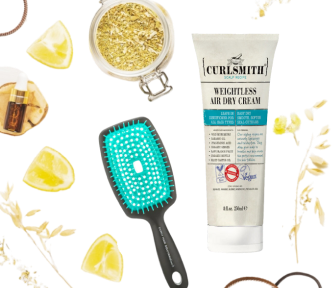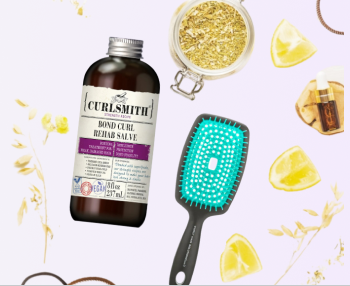Summer will be here before we know it! A question we get frequently at Curl Warehouse is whether we need to change our routine or our products for the seasons.
The short answer is: probably.
This is most applicable for those who live in humid climates because this is where frizz and ‘poofy’ hair seem to be a common issue in the summer months. Summer is also the time consider lighter products for finer textures and this may mean putting away the creams and heavier leave ins you were using in the winter.
You will want to get yourself a primer that has some film-forming humectants. Simple common humectants are glycerin(e), propylene glycol and sorbitol.

What are film-forming humectants?
Film-forming humectants are plant gels, hydrolyzed proteins and polymers. They can also sometimes be oils, which can be used to help seal the hair.
Humectants as a whole (simple or film-forming) are moisturizers and curl support/enhancers! They attract water. In very humid conditions they will pull water from the atmosphere into your hair. As some of you know, glycerin gets a bit of bad rap in high humidity because it tends to over work, pulling in so much moisture you get frizzy.
In the summer, however, these film-forming ingredients will slow down the loss of water from your hair, keeping it flexible. It will also prevent more water from being drawn in in areas of high humidity/dew point.
These ingredients work best in your styling products - the products that stay on your hair and are not rinsed out. Here’s a good list!
Plant Gels
- Aloe Vera

- Hydroxyethylcellulose
- Pectin
- Xanthan gum
- Guar gum
- Marsh mallow root
- Slippery elm
- Carrageenan (also known as irish moss or seaweed extract, sea emollient, sea algae, sea vegetable)
- Nettle leaf tea or nettle extract
- panthenol* (this one doesn't have a lot of data yet)
Hydrolyzed Proteins
- Hydrolyzed ________(source of protein) protein
- Peptides (wheat, oat, soy...)
- Amino acids (wheat, oat, soy) or glycine, alanine, proline, etc.
- Cocodimoniumhydroxypropylhydrolyzed _________ (source of protein, i.e. keratin, silk, rice, soy)
- Cocoylhydrolyzed ________ (source of protein)
- Potassium cocoylhydrolyzed ________ (source of protein)
- Hydrolyzed oat flour
Polymers
- Polyquaternium-69
- Polyquaternium-70
- Polyquaternium-72
- Polyquaternium-11
- Polyquaternium-10
- Polyquaternium-4
- Polyquaternium-28
- PVA/VP Copolymer (particularly in addition to any of the others here as alone it tends to fail in very high humidity over time)
How to Modify Your Routine for Summer
Create a Base with Your Primer
Your first product in should have little to no simple humectants and a balance of film-forming ones. I do recommend brushing in your primer so it coats all of your hair.
Oasis Hydrating Primer from Original Moxie has glycerin(e) but remember not everyone’s hair or climate reacts to it! It has protein and panthenol.
Ecoslay's Orange Marmalade is glycerin-free with plant gels but no protein.
ReFlex from TreLuxe has protein and propylene glycol along with hydroxyethyl cellulose. This is good choice if you try to avoid glycerin, regardless of the season.
Curl Keeper Original has glycerin, no protein, and contains hydroxyethylcellulose.
90% Humidity Solution blocks the effects of humidity on your hair without having to add or remove styling products from your routine that are already working well for you.
Set It With A Hard-Holding Gel
One thing you will want to use over your primer in humid climates is a hard-holding gel.

A popular choice is Ouidad's Advanced Climate Control Heat & Humidity Gel.
The Spray Gel Thermal Setting Spray from AG Hair might work best sprayed into your hands instead of your hair. Then you can apply it as needed with your hands.
Liquid Effects Extra Firm Styling Lotion from AG Hair has a liquid-y consistency. It offers a good hold.
Jello Shot from Ecoslay is very thick. You may need to emulsify this one in your hands with a little water before application, especially if you have finer hair.
For those in drier climates, you may find that avoiding simple humectants isn’t as necessary as you won't be dealing with summer humidity. You can follow these same guidelines with a bit less worry about excessive frizz!
References
Film Forming Humectants - What They Are and Why You Need Them, Science-y Hair Blog




